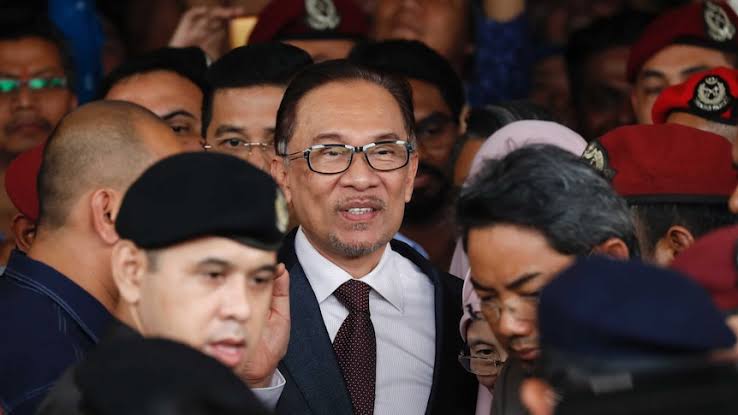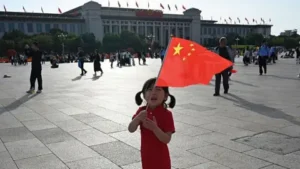From prisoner to 10th PM of Malaysia

Anwar Ibrahim, now the 10th PM of Malaysia Born on August 10, 1947, Anwar Ibrahim hails from Cherok Tok Kun, a small town in Bukit Mertajam, Penang.
He began his political career as a student activist in the late 1960s, during which he held posts in several student union bodies including the National Union of Malaysian Muslim Students and the University of Malaya Malay Language Society, to name a few.
Press conference as 10th PM of Malaysia
He arrived to give his first press conference just three hours after being sworn in as PM.
It was certainly a historic moment for many of his supporters considering the 75 year old, journey to make it to the top.
His appointment is the result of a decades-long political journey that saw him almost elected to the job – not once, but twice.
It is safe to say that not many heads of government have gone through the type of political prosecution that Anwar has endured.
Giving his first press conference as prime minister on the night of 24 November, the Pakatan Harapan coalition chairman outlined his goals and aspirations for the nation.
Anwar said his government would “guarantee and safeguard the rights of all Malaysians, especially the marginalised and impoverished, regardless of race or religion,” adding that he would not receive a salary throughout his premiership.

He also emphasised the need for wide-ranging institutional and economic reforms.
During the late-night event, he also made this declaration: “We will never compromise on good governance, the anti-corruption drive, judicial independence, and the welfare of ordinary Malaysians.
Founded the Muslim Youth Movement of Malaysia
In 1971, he founded the Muslim Youth Movement of Malaysia, better known by its Malay abbreviation ABIM, to champion Malay and Muslim issues. He famously participated in demonstrations against rural poverty and other socio-economic issues, for which he was arrested in 1974.
He was imprisoned under the Internal Security Act (ISA), which allows for detention without trial, and spent 20 months in the Kamunting Detention Centre.
His arrest became a blessing in disguise as it raised his political profile, which caught the attention of then prime minister Mahathir Mohamad.
The latter convinced him to join the ruling United Malays National Organisation (UMNO) party, the superstar component of the Barisan Nasional (BN) coalition, which had ruled Malaysia since it gained independence in 1957.
As Anwar accelerated through the ranks, gaining key ministerial portfolios and ultimately the deputy prime minister post, Anwar established himself as a charismatic, ambitious, and reform-minded politician.
Corruption charges
He was the obvious first-in-line to be the next prime minister. However, as the 1997 Asian financial crisis worsened, Mahathir turned against the successor he had chosen, supposedly due to conflicting opinions on how to resolve the crisis.

Anwar was sacked by the government and UMNO in September 1998 and charged with corruption and sodomy, an act that is considered illegal in Malaysia.
6 years prison
The courts sentenced Anwar to prison for six years in April 1999 for corruption and nine years for sodomy in 2000, both to be served consecutively.
The sodomy verdict was later overturned, resulting in his release from prison in 2004.
2015 prison
Anwar, however, returned to prison in 2015 to serve another five-year term following a second sodomy conviction, which he maintains was also being politically-motivated.
Royal pardon 2018
Following Pakatan Harapan’s historic victory in 2018, which ended Barisan Nasional’s (BN) 60 years of rule, Anwar was given a royal pardon and released after serving a total of about 10 years in prison.

Alliance with Mahathir
Nearing that election, he surprised the world by teaming up with his former mentor and nemesis Mahathir, this time under the PH banner, to defeat the Najib Razak-led BN administration, which was implicated in the massive scandal involving Malaysia’s 1MDB sovereign wealth fund.
However, Anwar’s path to the top was blocked yet again when Mahathir backtracked on his pledge to cede power and the PH government fell apart due to internal strife in 2020.
Finally Malaysia’s 10th PM
This year, in the 15th general election, Anwar proved he is still a formidable force after PH swept more than 80 seats nationwide and became the largest party in parliament.
However, that was not enough to garner the minimum 112 seats needed to obtain a simple majority required to form a government.
After days of political impasse, the king finally appointed Anwar as Malaysia’s 10th prime minister to lead a unity government that includes BN and a bloc of Sarawakian parties, the Gabungan Parti Sarawak (GPS).
Anwar has also welcomed other parties to join the administration. And so, after over 20 years, the wait is over. Anwar is finally Malaysia’s leader.
But now he faces the gargantuan task of forming a government consisting of numerous disparate parties and solving the urgent economic, social and institutional challenges currently facing the country.
Realising that his position is still not on solid ground given PH’s failure to command at least half of the seats in parliament, Anwar has announced that he will seek to confirm his legitimacy via a vote of confidence on December 19.


